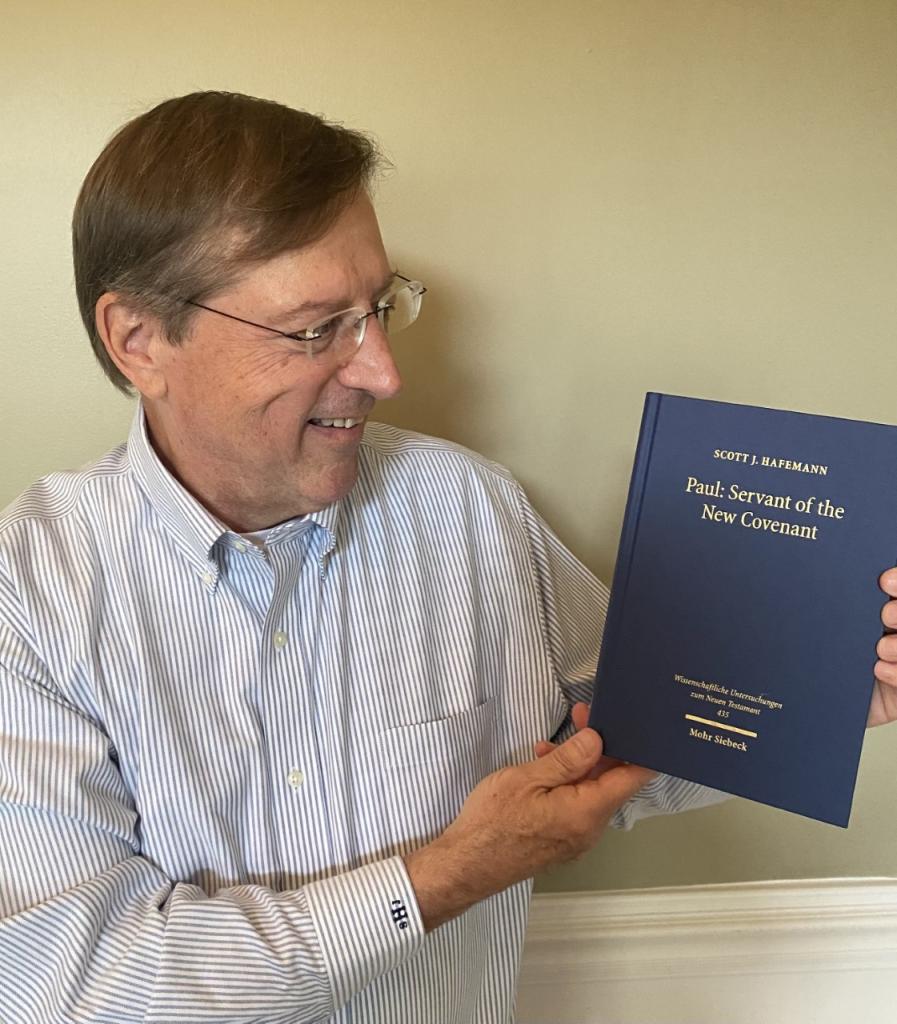I am privileged to conduct an interview with Dr. Scott Hafemann. We met fairly recently as participants at a conference conducted by Prof. Florian Wilk of the University of Göttingen. Our papers from that meeting have now been published in Paul and Moses: The Exodus and Sinai Traditions in the Letters of Paul (Florian Wilk, editor; published by Mohr Siebeck).
Dr. Hafemann is world-class biblical scholar and professor who has taught at Wheaton College, Gordon-Conwell Theological Seminary, and St Mary’s College, University of St. Andrews, in Scotland. He did his doctoral work many years ago at the University of Tübingen, Germany (under Peter Stuhlmacher, professor emeritus).
Some of his many works include the NIV Application Commentary on 2 Corinthians (published by Zondervan), The God of Promise and the Life of Faith: Understanding the Heart of the Bible (Crossway Books), Suffering and Ministry in the Spirit (Eerdmans, Wipf and Stock), Paul, Moses, and the History of Israel (Mohr Siebeck, Wipf and Stock); and a co-edited work with N. T. Wright and Mark Elliott entitled, Galatians and Christian Theology (Baker Academic).
The book we are focusing on is his most recent, Paul: Servant of the New Covenant (Mohr Siebeck). This book is an important capstone for Hafemann’s theology of Paul.

Interview
B. J. Oropeza: Welcome, Scott!
Scott Hafemann: Thank you so much for your interest in my work. It is a great encouragement.
B. J.: In your new work, you focus on Paul’s new covenant perspective in his major letters. Not long ago you also wrote a work on Paul and covenant entitled, Paul’s Message and Ministry in Covenant Perspective: Selected Essays (Eugene: Cascade Books, 2015).
Scott: Yes, both books are updated collections on the same related theme. The new work is also a substantial expansion of my attempts through the years to map out the essential contours of Paul’s apostolic life and theology. Both books endeavor to show the ways in which Paul’s self-understanding as a “servant of the new covenant” (2 Corinthians 3:6), in the light of the “old covenant” (2 Corinthians 3:14; see too Galatians 4:24; 1 Corinthians 11:25), informed virtually every aspect of his conception of the gospel. This self-understanding also informed his call to suffer as a “slave of Christ,” his careful reading of the Scriptures, and his view of the church as the dawning of the “new creation” (Gal 6:15; 2 Cor 5:17).
B. J.: How is your current book different from the earlier one?
Scott: My former volume focused on the outworking of these perspectives in Paul’s ministry and was aimed at a broad, yet informed audience. My new work focuses on a detailed exegesis of those texts that contain the theological convictions that drove Paul as an apostle.
Though I hope it will be accessible to serious readers (my 90-year old mother, to whom it is dedicated, is working through it!) it is aimed at fellow scholars, and the primary texts I address are Galatians 3:6–14; 4:21–31; 5:1–6:16; 1 Corinthians 7:17–24; 2 Corinthians 3:6–18; 5:11–21;10:12–18; Romans 2:12–16; 11:25–32; 15:1–13; and Philippians 3:8–9.
B. J.: What do you consider to be the most important things for your readers to know about Paul’s New Covenant?
Scott: Foremost, that the “new” covenant proclaimed in Jer 31:31–34 and Ezek 36:24–32, which forms the framework for Paul’s theology, shares the same threefold-structure and content, eschatologically interpreted, as the “old covenant.”
B. J. And what is this three-fold structure?
Scott: God’s relationship with his people is set forth in terms of its covenant prologue, covenant commands, and covenant promises of blessings and curse.
B. J. Could you explain these in a bit more detail?
Scott: Sure. First, regarding the covenant prologue, I mean that both covenants are based on God’s unilateral and unconditional acts of deliverance in the past by which he identifies himself as the redeemer/deliverer of his people
Second, these acts of deliverance entail and make possible inextricably linked covenant commands regarding the life of his people in the present. These covenant commands may be understood in terms of “the obedience of faith,” i.e., the obedience to God’s covenant stipulations as the organic expression of dependence on his ongoing provisions and promises, both of which derive from God’s saving commitment to his people encapsulated in the covenant prologue
Third, the keeping or violation of these commands either maintain or destroy the covenant relationship and thus lead to the covenant’s consummation in the future—the covenant promises of blessing and curse.
The life of faith, hope, and love in the present is thus made possible by God’s provisions granted in the past and motivated by his promises for the future.
B. J.: How does this covenant relationship play out for believers in Christ?
Scott: Although there are several covenants throughout the history of salvation, they all embody the same covenant structure. As such, the “new covenant” established in and through the Messiah sets forth the same kind of relationship between God and his people as that established with Abraham and Moses. The aspects of the covenants find ever-greater fulfillment and application throughout redemptive history. But the nature of God’s relationship with his people, through which he reveals his faithfulness, remains the same.
For the new covenant, the provisions thus focus on the cross of the Messiah, on the presence and power of the Spirit, and on the advocacy of the ascended Christ. The covenant stipulations focus on the love embodied in God’s commands. The promises for the future focus on the return of Christ as judge of all and on the consummation of the new creation, including the vindicating resurrection of God’s people.
Hence, the covenant relationship, as a dynamic, mutual relationship that is initiated, sustained, and fulfilled by God’s sovereign election and grace, is one of unconditional conditionality—to give just one example, see 1 Corinthians 6:9–11.
B. J.: “Unconditional conditionality” sounds somewhat similar to John Barclay’s interpretation of grace, which he understands as the phenomenon of a gift being “unconditioned (free of prior conditions regarding the recipient) without also being unconditional (free of expectations that the recipient will offer some ‘return’)”: Paul and the Gift, 562.
Given your example from 1 Corinthians 6:9–11, this would seem to mean that Paul affirms unconditionality in terms of the Corinthian believers being gifted with salvation—they are washed, sanctified, and justified via the name of Jesus Christ. And yet there is conditionality, too—Paul warns them not to be deceived about their committing acts of unrighteousness, since vice-doers will not inherit God’s kingdom. Am I on track here with what you are saying?
Scott: Yes! Notice too that for Paul, our justification, which here must include our passing God’s judgment at the end of the age, is therefore also brought about by the Holy Spirit’s work of sanctification.
So I agree with Prof. Barclay’s important exposition of Paul’s understanding of grace. But whereas, for Barclay, there is an unresolved tension between the conditionality and unconditionality of God’s grace, I maintain that this tension is resolved once we understand the covenant structure throughout Scripture.

B. J.: Do continue.
Scott: In reading Paul, we must therefore be alert to the ways in which this threefold covenant structure, though often implicit, was the key to Paul’s biblical way of thinking. For Paul, the “hearing/obedience of faith” is the stipulation of a covenant relationship that is both created and sustained unconditionally by God’s election, by the redeeming cross of Christ, and by the transforming presence of the Spirit.
Hence, for Paul, only those who exercise faith in the faithfulness of Christ will be justified. That is because this faith, by its very nature and by the power of the Spirit, works out in the love that fulfills the Torah. Once we recognize the organically related covenant structure of Paul’s thought, it becomes clear that since justification is by faith, judgment must be by works. In Paul’s words, only “the doers of the Torah will be justified” (Rom 2:6, 13). Faith, for Paul, can never be separated theologically, sequentially, or experientially from obedience.
B. J.: I don’t disagree with what you are saying since Paul speaks of “faith working through love” (Gal 5:6). Faith, then, needs to be, and always will be manifested in loving others and loving God. This is also what Jesus in the Gospels says. On these two commandments the whole Law and the Prophets depend (Matt 22:37-40).
Scott: Exactly. Of course, to stress the unity between the structure and content of the old and new covenants as the key to Paul’s theology raises this age-old question—what then is “new” about the “new covenant”? In other words, where are the lines of discontinuity between Paul’s theology and mission and that of the history of Israel as detailed in his Scriptures?
The burden of my work is to demonstrate that the contrast between the old and new covenants is eschatological, not material (hence the subtitle of my book: Pauline Polarities in Eschatological Perspective). The “problem” with the old covenant was not its content or structure. It resides in the fact that, in God’s providence, the old covenant was established with only a remnant of Israel, thereby leaving its original intention of saving Israel and the nations still awaiting fulfillment (Rom 11:1–32).
According to Jeremiah 31:31–33, the Torah was given to Israel without transforming her people’s hearts, and hence the covenant could not be kept and its promises of eschatological blessing were not realized. Now, with the inauguration of the new covenant of the new age of the new creation, Paul’s proclamation of the gospel is matched by his mediation of the heart-transforming Spirit (cf. Ezek 36:26–27). As a result, all those called into the new covenant community, both Jews and gentiles, become covenant keepers on the way toward the consummation of the covenant promises when the Messiah returns (2 Cor 3:1–18).
B. J.: So what happens to the Torah in this new era?
Scott: The “old covenant” has been brought to an end not because it was deficient theologically or because its stipulations were impossible to keep in terms of their requirements (neither the old or new covenant demand sinless perfection in order to be righteous!). It ended because the new covenant, with its continuation and fulfillment theologically and with its Spirit-enabled realization experientially, has arrived. Inaugurated eschatology must be taken to be the key to Paul’s theology.
So by looking again in detail at the central theological passages in Paul, my goal is to show that the Pauline polarities—once understood in their eschatological, covenantal contexts—should not be construed as material contrasts between two different ways of relating to God. For example, they should not be construed as a Law-way vs. a Gospel-way, a Torah-way vs. a Promise-way, a works-way vs. a faith-way, a sin-way vs. a grace-way, a Moses-way vs. an Abraham- or Christ-way, or an Israel-way vs. a church-way.
Rather, these polarities, both individually and when taken together, represent an eschatological contrast between the purposes of God within the two historical epochs that frame the history of redemption. And the Christ event separates those epochs.
B. J.: We don’t have time to go into each of the chapters in your book, so I’ll pick just one. I noticed you wrote a chapter on Romans 11, the climax of Paul’s discussion regarding Israel (and some would argue, the climax of the entire letter). In it you argue that the consummation of the covenant includes the hope for the future salvation of “all (ethnic) Israel” (Romans 11:26). Could you explain your view?
Scott: This is a much debated, controversial text. My view is that Paul understands that the covenant promises, first made to Abraham and then reiterated to Israel via the Sinai and Davidic covenants, include the eventual salvation of a vast number of Abraham’s descendants. Moreover, through their redemption a great conversion of gentiles takes place (see Romans 11:15). For Paul, this promise still stands, like all of God’s promises (Rom 11:29). And I think this is the covenant promise to which Paul is referring in Romans 11:26–27 when he quotes Isaiah 59:20–21 and 27:9, understood in their original contexts.
So Paul is looking forward to that day when, in tandem with the return of Christ, a great number of ethnic Jews will come to faith in Jesus as their Messiah. For Paul, this is all to the glory of God (Rom 11:32–36).
B. J.: Scott, it has been a pleasure engaging with your work. Thank you!
Scott: B. J., actually, the pleasure has been all mine—what a privilege to be able to share my work with your readers. Thank you for your helpful questions!
Image 1: Scott Hafemann’s personal picture sent to me by the author; Image 2: Holy Spirit dove window church via pixabay.com













